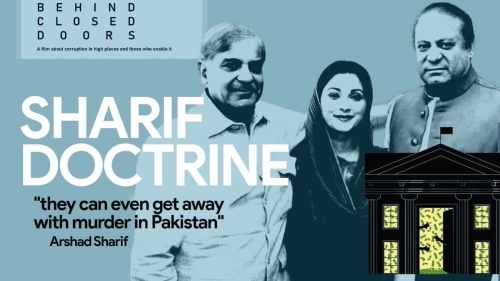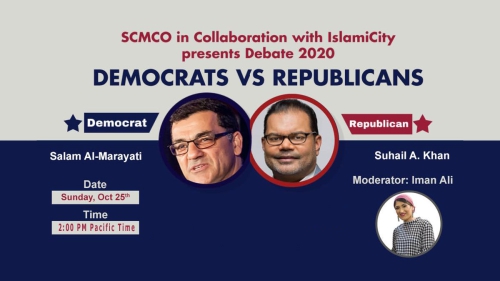Farewell Adalusia: Apostasy bill a step backwards for Islam in Malaysia
By now most of us would have heard about the Islamiah Aqidah Protection Bill that has been passed through the legislature of the state of Perlis and is making its rounds in the corridors of power in the country. The bill 'provides for the protection, rehabilitation and determination of the aqidah of a Muslim and matters concerned therewith'. Immediately after the Aqidah Protection Bill made its way through the state legislature of Perlis, news of it spread all over the country. We are now set to witness yet another heated controversy over the question of how Islam can and is being used by the State in order to control the Malay-Muslim constituency.
Before proceeding any further, it would be useful for all of us to have a closer look at the Bill in order to understand what its real intention was and to identify just how and why it may fail to achieve those stated aims. There is no better way of doing this than by attempting a close reading of the text of the Bill itself.
Ostensibly, the Aqidah Protection Bill attempts to do one simple thing: It aims to protect the Muslim community from what it regards as the social ill of apostasy- irtidad- and it aims to identify those Muslims who are guilty of irtidad and isolate them from the rest. From the outset the Bill has a distinctively defensive and reactive feel about it. Rather than take proactive steps to explain Islam to Muslims and non-Muslims alike in an open and progressive way, it seeks to close the doors of the Muslim community in order to prevent some of these Muslims from falling outside the confines of the Ummah.
The bill regards any attempt to change the aqidah of an individual as a problem. What is meant by this? According to the bill itself, ' "attempt to change aqidah" means any act by a Muslim who is mukallaf on his own free will either by word, deed or any means that may be interpreted as an attempt to change his aqidah and belief towards religion (2.1)'. This in effect means that one can be judged not only for what one might say or do, but also for 'other means' that may be interpreted as being detrimental to one's faith and practice of religion. Just what criteria is being used to make these judgements remains unclear, as we shall see below.
The Bill also has a punitive character to it. Those who are found guilty of apostasy will be sent to 'Aqidah Rehabilitation Centres' where, presumably, they will be brought back to the 'true path' of Islam. Just how this process of rehabilitation is to work remains unclear- the Bill does not specify what such 'rehabilitation centres' are supposed to do and what goes on in them. In fact, it does not even tell us where such centres will be located. Clause 14 of the Bill gives the Majlis Ugama Islam dan Adat Istiadat Melayu (Religious and Adat Council) of the state the power to 'determine any place or institution as an Aqidah Rehabilitation Centre for the purposes of this enactment', but tells us nothing about who will run these centres and what kind of work they will be doing there. One gets the impression that the bill is more concerned about isolating 'bad Muslims' from good ones and that the detention of these suspect individuals is the real priority.
The most worrisome aspect of the bill is the fact that it gives so much power to the Shariah Court and Judges to decide on cases where the faith and aqidah of a Muslim individual has come into question. According to clause 3 of the Bill, 'The (Islamic) Court shall have jurisdiction to- (a) declare that a person is no longer a Muslim, (b) declare the religious status of a Muslim who has died, and (c) make any other order as it deems fit in relation to the matters stated under paragraphs (a) and (b)'. The Bill also adds that a Muslim will be treated as a Muslim 'unless a declaration has been made by the (Islamic) Court under this enactment that he is no longer a Muslim'.
The net result of all this is that our identity and status as Muslims is now a matter of State rather than personal faith. The Perlis Bill has, in effect, opened the way for the State religious authorities and religious courts to decide who exactly is a Muslim and who is not. In other words, the boundaries of the Muslim Ummah are being policed by State authorities who will, from now on, be able to decide who belongs to the community and who doesn't. There is no room for individual interpretation of faith any longer- this has now become a matter for the State authorities to decide.
To hammer this point home, the Bill also makes it clear that the State religious authorities are free to act on their own and to take their own initiatives when deciding who is a Muslim and who is not- all justified on the grounds of 'protecting' the Muslim Ummah as a whole. Clause 5 of the Bill which looks at 'Information and Investigation' clearly states that 'if from information received or otherwise a Shariah Enforcement Officer has reason to suspect the commission of an attempt to change aqidah of a Muslim, he shall as soon as possible investigate the matter'. Two crucial points need to be remembered here: The Shariah Enforcement Officers of the State are hereby given the authority to take their own initiative against other Muslims based on 'information received or otherwise' which would lead them to 'suspect' the faith and aqidah of others. Needless to say, this opens the way for denunciations and fitnah, where some people might be accused of being 'bad Muslims' by others for purely malicious reasons. It also affords the Shariah Enforcement Officers too much room to work on suspicion alone. What compounds the problem even further is the fact that the criteria for what exactly amounts to 'suspicious' behaviour remains unclear.
Despite these grey areas of uncertainty, Clause 6 of the Bill affords the Shariah Enforcement Officer 'all the powers conferred on him under the Criminal Procedure in the Syarak (Shariah) Enactment of 1991, as if he is conducting a criminal investigation under such Enactment'. In other words, acting on accusations and suspicion alone, a Shariah Enforcement officer will have the power to undertake a criminal investigation against Muslims who may not even know that their faith and aqidah has come under the questioning glare of others.
Clause 7 of the Bill then allows the Shariah Enforcement Officer to make an application to the Shariah Court for a summons to be issued in order to bring the individual whose aqidah is under question to the Court. The Officer is even allowed to apply for a warrant of arrest, in order to force the individual in question to come forth. All of this is based on 'sufficient evidence or reasonable ground of suspicion (7.1.a)' alone- once again giving nearly all power to the Shariah Enforcement Officers themselves.
The punitive aspect of the Bill becomes most evident when we go through clauses 8, 9, 10 and 11 of the Bill. Under clause 8 of the Bill, an individual who 'refuses to repent' will 'be detained at the Aqidah Rehabilitation Centre for a period not exceeding one year (8.b.i)'. Just what these 'rehabilitation centres' are and what they are meant to do remains unclear. There is nothing specifically laid out in the Bill that tells us what form of 'rehabilitation' is going to take place in these institutions. However it is clear that those who are sent to them are going to be sent there under custody of the State- it is obviously not a matter of free choice.
Those who 'repent' before or during the serving of their custodial sentence will be brought to the judge and who will release them if he is satisfied that their 'repentance' is genuine (9.1., 9.2). For those who still refuse to repent, there are other measures that may need to be taken. If they refuse to repent to the end, the Shariah Court judge will have the power to declare them non-Muslims (10.3.b.i). Should they be married at ,the time the judge will also have the right to dissolve their marriages and determine their other liabilities and obligations (11.3.a). The Court is therefore being given the right not only to decide who is a Muslim and who is not, but also to break up the marriages of those who are regarded as being apostates as well.
Finally clause 15 of the bill opens the way for additional rules and penalties to be introduced in the future. It states that 'the Ruler, on the advice of the Majlis, may, by notification in the gazette make rules as may be necessary or expedient for the purposes of carrying into effect the provisions of this enactment'. 'Necessity' and 'expediency' are obviously the key words here. Clause 15 allows for additional rules that may 'make provisions for the control, isolation, detention, protection and rehabilitation of the person detained in any of the Aqidah Rehabilitation Centres (15.2.a)'. The additional rules may also 'regulate the procedure of admission to or discharge from an Aqidah Rehabilitation Centre (15.2.b) '.
And finally, the additional rules may 'make the contravention of or failure to comply with any regulation made under this Enactment an offence and may prescribe a fine not exceeding one thousand ringgit or imprisonment for a term not exceeding six months for such offence (15.2.d)'.
It is clear that the Perlis Aqidah Protection Bill is littered with loopholes and regulations that can only be described as problematic. Legal experts will no doubt be able to point out the inconsistencies and contradictions that exist in the document. But there are other important issues that have been raised thanks to the appearance of this Bill on the political terrain of Malaysia today. These are the things that we also need to address, for they serve as the real socio-political and cultural backdrop against which the Perlis Bill's existence can be understood and explained.
Farewell Andalusia: A Blow to progressive Islam in Malaysia.
It doesn't take much for us to see that what is happening in the country today is part and parcel of the process of modernisation of Islam itself. In practically every other part of the contemporary Muslim world, religious authorities and ruling elites are in the process of using Islam as a means of social control and policing. More often than not the introduction of new legislation to control, domesticate and police the Muslim Ummah are justified by the call to 'protect Islam' from threats internal and external, real or imagined. But the net result is the same: we open the way for the creation of highly centralised political systems where religious authorities have the power to penetrate even deeper into the private spaces of Muslim individuals.
But those who know their Islamic history will know that the greatest achievements of the Muslim world lay in the great Andalusian adventure. I am referring to the Andalusian Caliphate which eventually fell before the advancing armies of the Reconquistadores by the end of the 15th century. Despite its eventual political eclipse and demise, the era of Andalusian Islam was perhaps one of the highest points of civilisational development for humanity as a whole.
This was an era characterised by progress, development, openness, tolerance and a radically different understanding of what Islam itself was. Islam, for the great thinkers, leaders and Imams of the Andalusian Caliphate, was not merely a religion but a way of life. They understood that Life itself is far too complex to be reduced to static ideological slogans and propaganda. The greatness of Islamic civilisation then was that it could accommodate other schools of though and world views. Andalusian Islam was noted for its tolerance of diverse religions, cultures, worldviews and lifestyles- as well as its tolerance of internal differences among the Muslims themselves. Till today the once-glorious architecture and art of An,dalusia remains, carrying within it the multifarious and polysemic echoes of other cultures- Islamic, Pagan, Roman, Greek, Egyptian, African and Asian. It was this internal differentiation that marked the greatness of Islam during the Andalusian era.
Another important factor that we tend to forget was that the Muslim world and the Muslim community then was also a highly complex and diverse entity. During the time of the Andalusian Caliphate, 'Dar-Andalus' was the home to thousands of persecuted Muslim thinkers, artists, intellectuals and politicians. Those who were though of as outsiders and pariahs in their own community could find a new home in this tolerant land where diversity of opinion and belief was tolerated and even celebrated. It all contributed to the 'good life' of Andalusia and the cultural richness of the place.
In time, however, this culture of openness and tolerance was brought to an end with the collapse of the Caliphate and the return of the Conquistadors. With the re-conquest of Andalusia, a new climate of religious intolerance was brought about by those who felt the need to police the boundaries of their respective religious communities. Muslims, Christians and Jews alike began to view each other with suspicion and contempt. In time the Muslims and Jews who would not convert to Christianity were forcibly expelled from the region. Those who remained were constantly under surveillance- in case their conversion to Christianity was a false one and that they were secretly guilty of apostasy in their hearts. This climate of suspicion and fear eventually contributed to the emergence of the infamous Spanish Inquisition, where members of every religious community were brought to the fore to defend their faith or die at the stake.
The horrendous mistakes that were made by the Inquisition in the name of Christianity are not unique to the Christian faith: Islam has also shown that it can be equally paranoid about its constituents. Over the centuries we have witnessed countless pogroms by Muslims against other Muslims, many of which were justified on the grounds that Islam was in danger of being corrupted from within by 'dangerous' elements that were 'not Islamic' enough. Now this tide of hysteria has come to Malaysia as well, and we need not look to the Taliban of Afghanistan for examples of Islam gone wrong.
Protecting Islam?
In many parts of the Muslim world today we see the rise of religiously conservative and reactionary movements and governments that seek new ways and means to control their respective Muslim populations. This tendency to create maximalist regimes with the power and ability to penetrate deeper and deeper into the private spaces of Muslims' lives is often couched in terms of a rhetoric of care and protection of the self. In countries like Iran, Afghanistan, Sudan and Nigeria we have witnessed the emergence of secret 'moral police', religious tribunals, fatwa councils and special courts that were all designed for one simple purpose: to control the hearts and minds of ordinary Muslims and to make sure that they conform to the established set of norms and values that have been set by others.
In some cases, we have also seen how defensive governments have taken up the Islamist's agenda in a pathetic attempt to match the Islamic credentials of the Islamic opposition. This is precisely how Pakistan came to the brink of collapse, when the government tried its best to out-Islamise the Islamic opposition movements. Judging by what has been said and written so far, it would appear that for many concerned people in the country the latest move by the Perlis legislature in the country smacks of the same kind of real politik considerations as well.
But what has to be remembered in the midst of all this is that such top-down State-sponsored and State sanctioned Islamisation has never worked. It was attempted by various Muslim governments li,ke the ones in Egypt (under Nasser and Sadat), Iraq, Libya (under Ghadaffi) and Pakistan. Invariably, such moves only lead to the governments in question falling into the trap of the Islamists. By trying to out-do the Islamist opposition by introducing more and more repressive and retrogressive legislation of their own, these besieged governments merely contributed to the inflation of Islamic discourse in their own societies and raised the stakes in the Islamisation race- Much to the delight of the Islamist opposition movements and parties!
What is worse, such retrogressive measures like forming secret 'moral police', religious councils and tribunals to hound out apostates and munafikin (hypocrites), etc. merely added to the climate of paranoia and anxiety which encourages religious extremism to thrive. The way out of this mess is by responding to the extremism of others with common sense and sound facts. So when members of the Islamic opposition party here go around making outlandish claims that 'hordes' of Muslims are leaving Islam, the most intelligent response would have been to reply with the truth. For the fact is that while a small number of Muslims have indeed left Islam (in many cases to revert back to their original religions), tens of thousands have come to Islam and continue to do so on their own free will on a yearly basis.
The fact that none of these steps have been taken when dealing with the social and cultural problems among the Muslims today is evidence of the fact that the progressive Islamist agenda has been sidelined in Malaysia. We have instead conceded valuable ground and discursive space to the demagogues and extremists who can only come up with empty slogans and fearful, thunderous sermons about how the enemies of Islam have to be put to the sword. Worse still, we have even begun to compromise our own position by falling into the same discursive arena with them.
Return to Andalusia.
If there is to be any hope for progressive Islam in Malaysia- and in other parts of the Islamic world- then the ruling elite (and by this I include not only those in government but also all those who are part of the process of managing the State as well) will have to sort out its priorities and get its agenda right. There remains the urgent, some would say critical, need for us to show that there is another way of looking at Islam which is not hemmed in by fear of difference and the Other.
Islam and the Muslim world needs progress. We also need development. Apart from that we need to come to terms with the pressing realities of life in the world which is always complicated, confused and therefore challenging. One of the challenges that the Muslim world will have to face in the near future is having to deal with difference and diversity within itself. We need to understand that for all Muslims, faith is a private thing which is negotiated on a daily basis. One does not have to belong to the Ulama class to know that one's religion is a matter of personal belief between oneself and God.
To allow for states and religious authorities to legislate morality and to intervene in matters of private faith is the first step to breaking down this highly personal relationship we have with our Religion. The day my religious beliefs become the matter of the State is the day that I cease to have a religion of my own. From that point onwards, every act of faith or piety that I perform is no longer mine, but that of external authorities. This does not bring us any closer to God or an understanding of Islam- It would be like the situation in Afghanistan where people are forced to pray at gunpoint, but without knowing why they are doing it and what makes them Muslims. For this reason, this bill which is being brought under discussion must be condemned for what it is- a retrogressive piece of legislature which threatens to erode the very basis of our faith itself.
There is st,ill hope for progressive modernist Islam in our country. Thankfully despite the obvious pressures, the Taliban have not taken over our hearts and minds- yet. But to ensure that this space of open, tolerant and progressive Islam remains and is further expanded is also the moral duty of every Muslim in the country- laymen and intellectual alike. We cannot continue dreaming that this blissful state of affairs will continue forever. If Andalusia was lost, it was largely due to the betrayal of the Muslims themselves, who failed to live up to the progressive ideals of the Andalusian adventure. 'You cry like a child for what you could not defend like a man'.
(Dr. Farish A Noor is a Malaysian political scientist and human rights activist. He is currently working and teaching in Berlin, Germany and is working on the subject of Islamist political movements in Southeast Asia.)

















